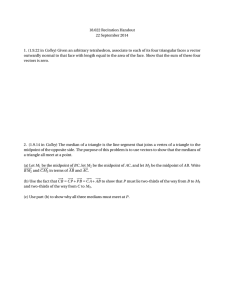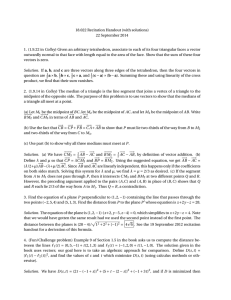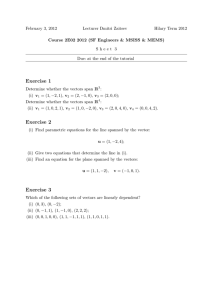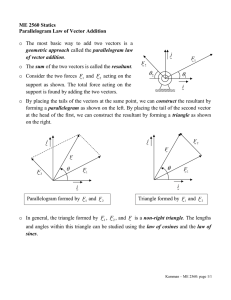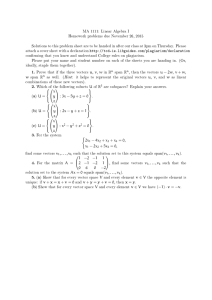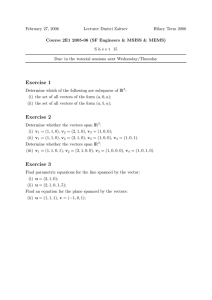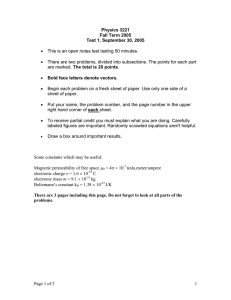Worksheet 2: vectors
advertisement
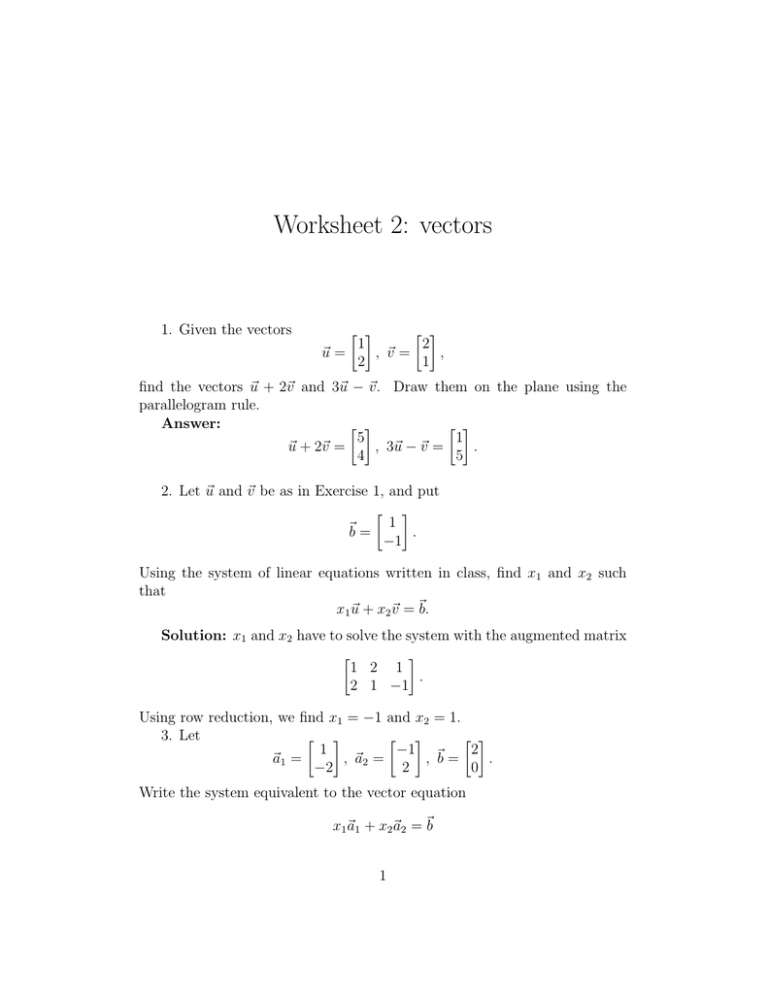
Worksheet 2: vectors 1. Given the vectors 1 2 ~u = , ~v = , 2 1 find the vectors ~u + 2~v and 3~u − ~v . Draw them on the plane using the parallelogram rule. Answer: 5 1 ~u + 2~v = , 3~u − ~v = . 4 5 2. Let ~u and ~v be as in Exercise 1, and put ~b = 1 . −1 Using the system of linear equations written in class, find x1 and x2 such that x1~u + x2~v = ~b. Solution: x1 and x2 have to solve the system with the augmented matrix 1 2 1 . 2 1 −1 Using row reduction, we find x1 = −1 and x2 = 1. 3. Let 1 −1 ~ 2 ~a1 = , ~a2 = , b= . −2 2 0 Write the system equivalent to the vector equation x1~a1 + x2~a2 = ~b 1 and solve it. Does ~b lie in Span(~a1 , ~a2 )? Solution: The augmented matrix of the system is 1 −1 2 . −2 2 0 After row reduction, we get an REF 1 −1 2 . 0 0 4 Since the last column is pivot, the system is inconsistent. Therefore, ~b does not lie in Span(~a1 , ~a2 ). 4. Give the geometric description of Span(~a1 , ~a2 ) for ~a1 and ~a2 from Exercise 3. Answer: The line passing through ~a1 and the origin. 5. Lay, 1.3.7. Answer: ~a = ~u − 2~v , ~b = 2~u − 2~v , ~c = 2~u − 3.5~v , d~ = 3~u − 4~v . 6. Prove the property (vi) in the gray box on Lay, p. 32, by analogy with what we did in class. Solution: Let u1 .. ~u = . ; un then du1 cu1 cu1 + du1 (c + d)u1 .. .. .. .. (c + d)~u = = . + . = c~u + d~u. = . . cun dun (c + d)un cun + dun 7. Lay, 1.3.24. Solution: (a) True, see the beginning of the subsection ‘Vectors in Rn ’. (b) True, use Fig. 7 to draw the parallelogram determined by ~u − ~v and ~v . (c) False; in fact, the linear combination with all coefficients zero will be the zero vector. (d) True; see the statement that refers to Fig. 11. (e) True; see the paragraph following the definition of Span. 2 8.* Let ~u1 , ~u2 , ~u3 be three vectors in R2 . Prove that the intersection point of the medians of the triangle with vertices ~u1 , ~u2 , ~u3 is given by the linear combination 1 (~u1 + ~u2 + ~u3 ). 3 (Hint: start with the formula for the midpoint of a segment we studied in class.) Solution: The midpoint of the interval with endpoints ~u2 and ~u3 is given by ~v = 12 (~u2 + ~u3 ). Now, we use the fact that the intersection point of the medians lies two thirds of the way between ~u1 and ~v ; therefore, it is given by 1 2 ~u1 + (~v − ~u1 ) = (~u1 + ~u2 + ~u3 ). 3 3 Alternatively, the calculation above shows that w ~ = 13 (~u1 +~u2 +~u3 ) lies on the segment connecting ~u1 and ~v ; that is, on one of the medians of our triangle. Since the expression for w ~ stays the same if we permute ~v1 , ~v2 , ~v3 , w ~ lies on each median of our triangle. As a byproduct, we recover the geometric fact that the medians of a triangle intersect at one point. 3
